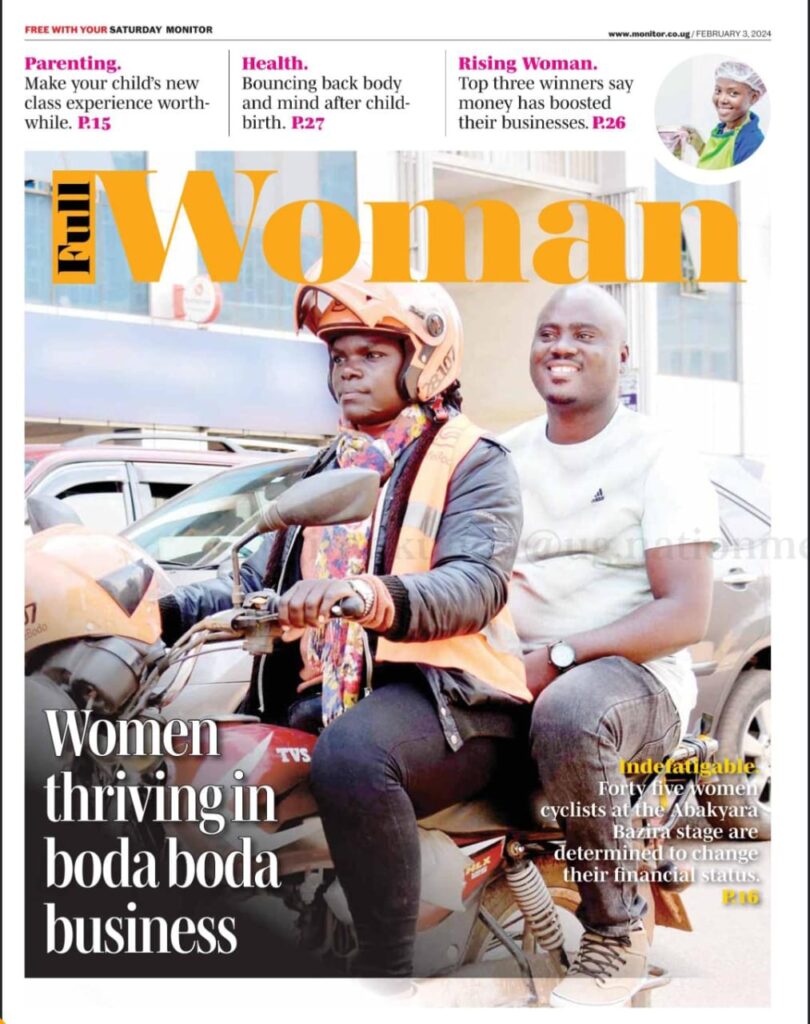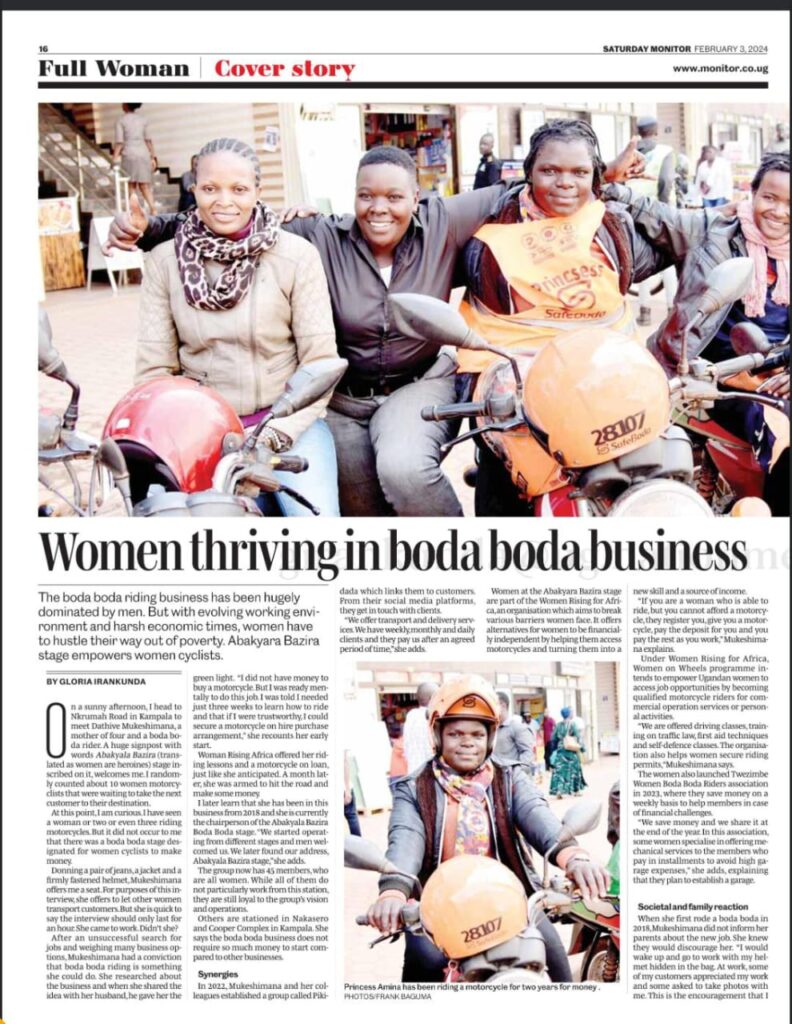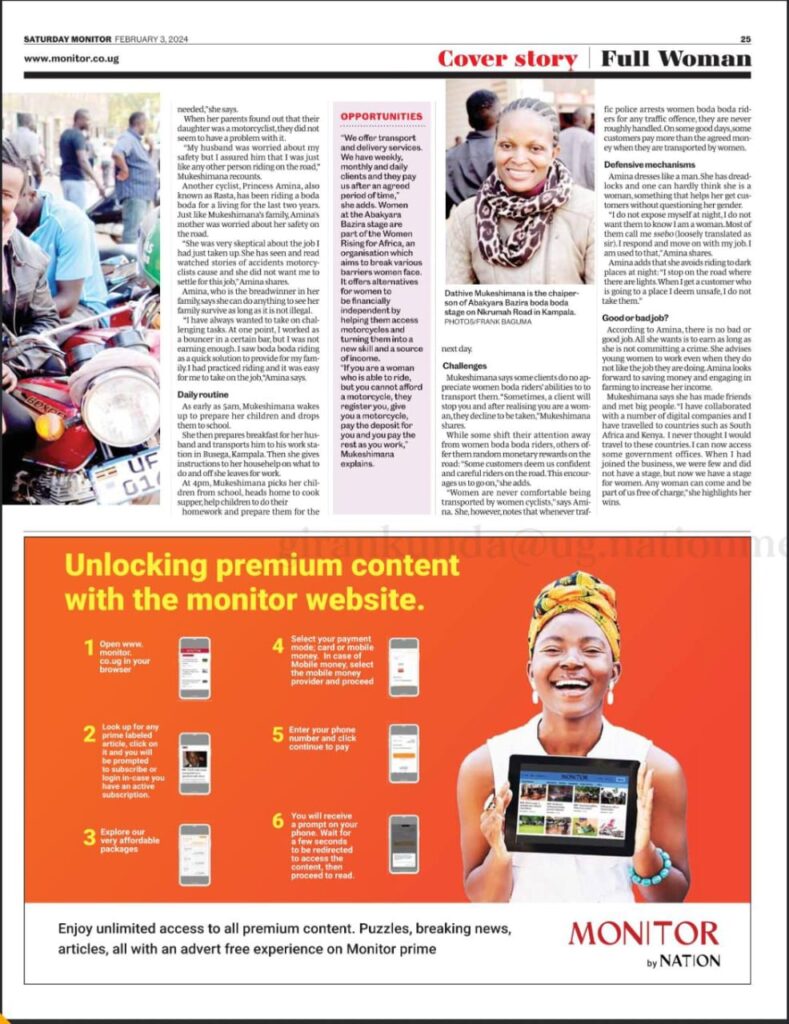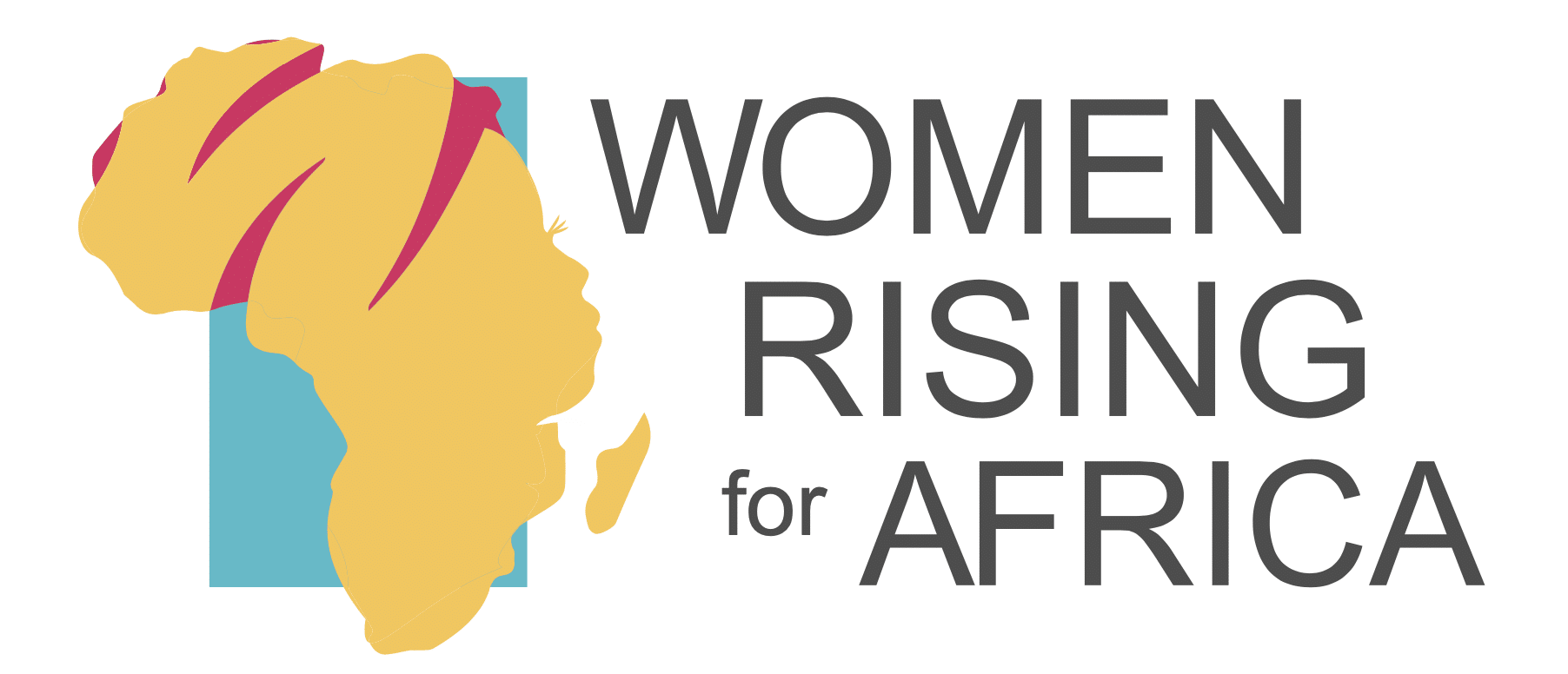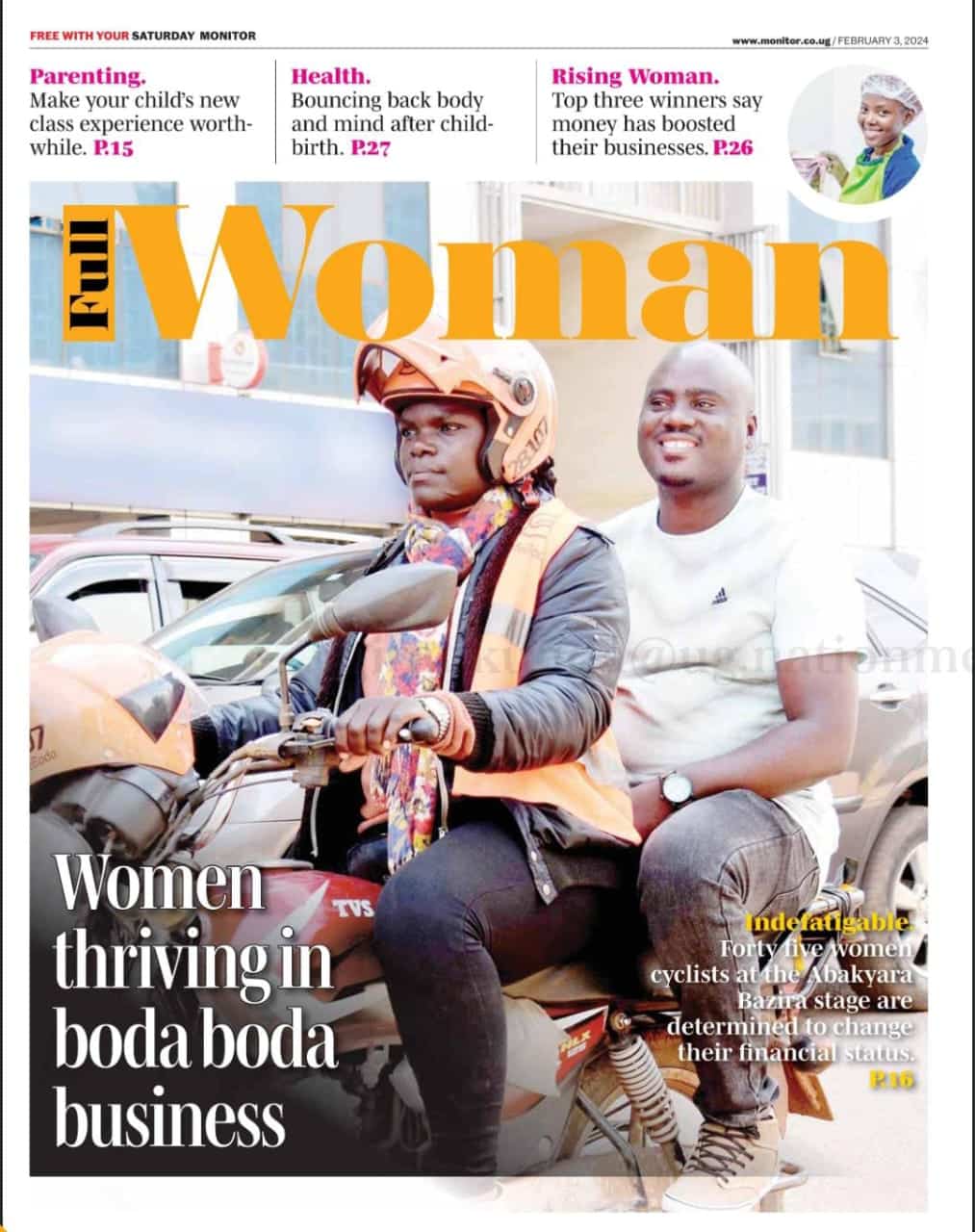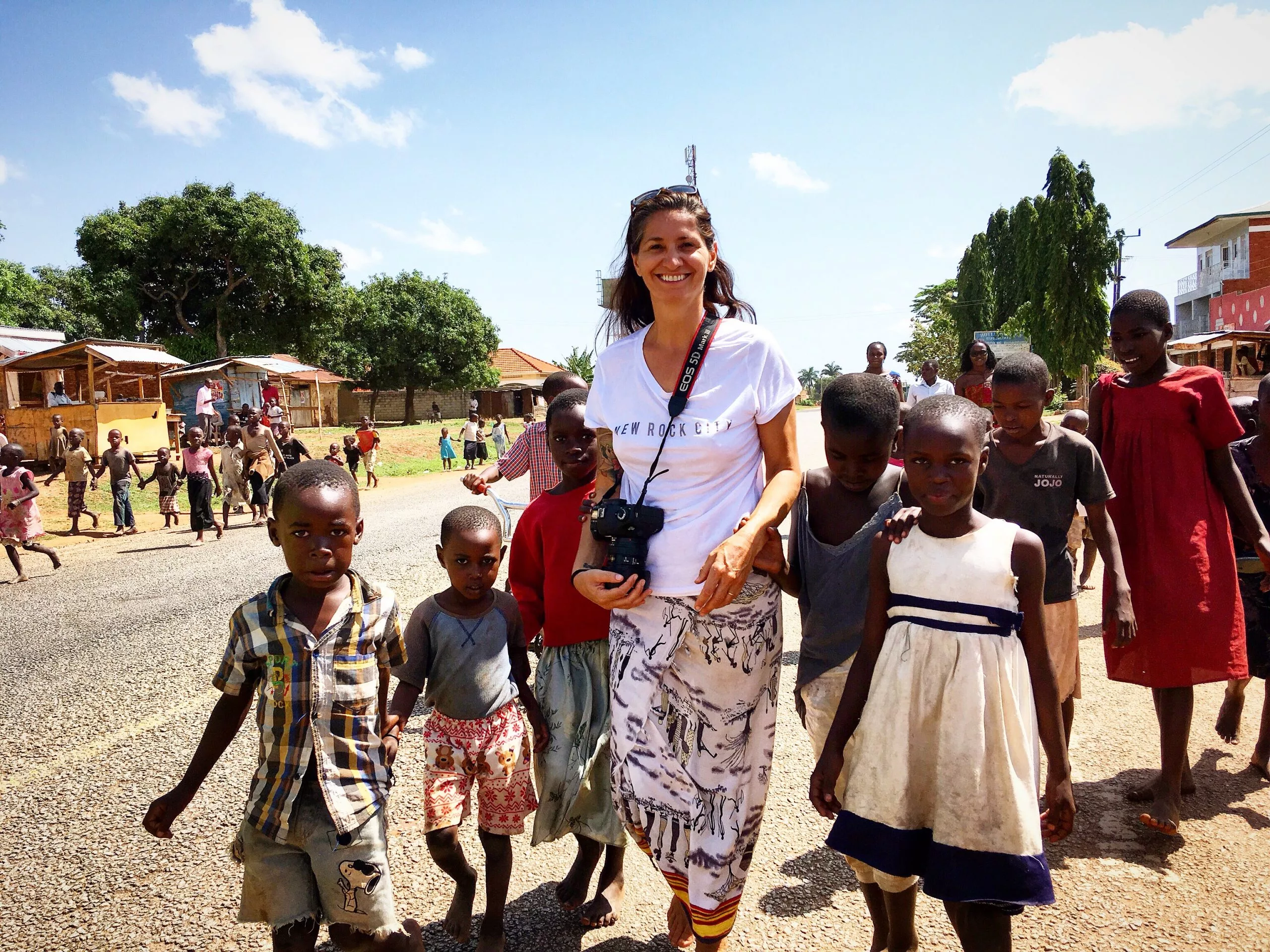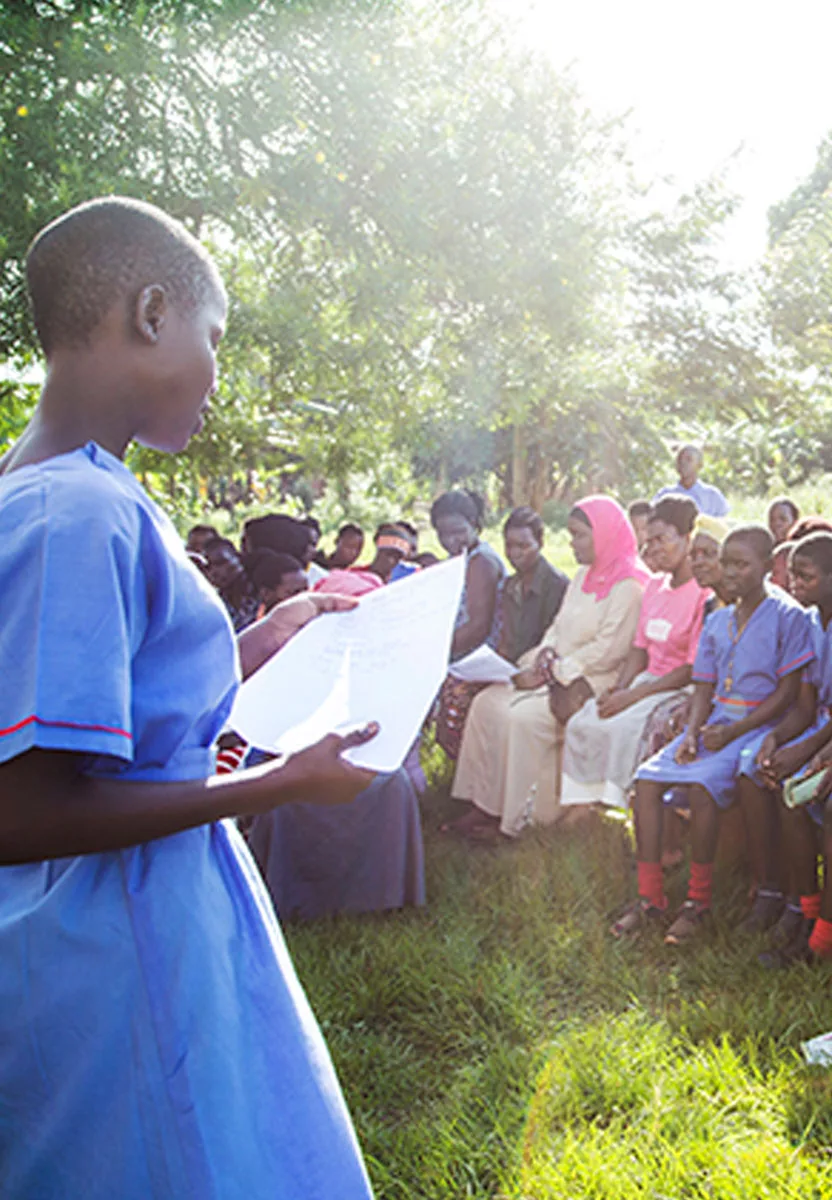On a sunny afternoon, I head to Nkrumah Road in Kampala to meet Dathive Mukeshimana, a mother of four and a boda boda rider. A huge signpost with the words “Abakyala Bazira” (translated as “women are heroines”) inscribed on it welcomes me. I randomly counted about 10 women motorcyclists that were waiting to take the next customer to their destination.
At this point, I am curious. I have seen a woman or two, or even three, riding motorcycles. But it did not occur to me that there was a boda boda stage designated for women cyclists to make money.
Donning a pair of jeans, a jacket, and a firmly fastened helmet, Mukeshimana offers me a seat. For the purposes of this interview, she offers to let other women transport customers, but she is quick to say the interview should only last for an hour. She came to work. Didn’t she?
After an unsuccessful search for jobs and weighing many business options, Mukeshimana had a conviction that boda boda riding is something she could do. She researched about the business and when she shared the idea with her husband, he gave her the green light. “I did not have money to buy a motorcycle. But I was ready mentally to do this job. I was told I needed just three weeks to learn how to ride and that if I were trustworthy, I could secure a motorcycle on a hire purchase arrangement,” she recounts her early start.
Woman Rising Africa offered her riding lessons and a motorcycle on loan, just like she anticipated. A month later, she was armed to hit the road and make some money.
I later learn that she has been in this business since 2018 and she is currently the chairperson of the Abakyala Bazira Boda Boda stage. “We started operating from different stages and men welcomed us. We later found our address, Abakyala Bazira stage,” she adds.
The group now has 45 members, who are all women. While all of them do not particularly work from this station, they are still loyal to the group’s vision and operations. Others are stationed in Nakasero and Cooper Complex in Kampala. She says the boda boda business does not require so much money to start compared to other businesses.
In 2022, Mukeshimana and her colleagues established a group called Pikidada which links them to customers. From their social media platforms, they get in touch with clients. “We offer transport and delivery services. We have weekly, monthly, and daily clients and they pay us after an agreed period of time,” she adds.
Women at the Abakyara Bazira stage are part of the Women Rising for Africa, an organization which aims to break various barriers women face. It offers alternatives for women to be financially independent by helping them access motorcycles and turning them into a new skill and a source of income. “If you are a woman who is able to ride, but you cannot afford a motorcycle, they register you, give you a motorcycle, pay the deposit for you, and you pay the rest as you work,” Mukeshimana explains.
Under Women Rising for Africa, the Women on Wheels program intends to empower Ugandan women to access job opportunities by becoming qualified motorcycle riders for commercial operation services or personal activities. “We are offered driving classes, training on traffic law, first aid techniques, and self-defense classes. The organization also helps women secure riding permits,” Mukeshimana says.
The women also launched the Twezimbe Women Boda Boda Riders association in 2023, where they save money on a weekly basis to help members in case of financial challenges. “We save money and we share it at the end of the year. In this association, some women specialize in offering mechanical services to the members who pay in installments to avoid high garage expenses,” she adds, explaining that they plan to establish a garage.
Societal and Family Reaction
When she first rode a boda boda in 2018, Mukeshimana did not inform her parents about the new job. She knew they would discourage her. “I would wake up and go to work with my helmet hidden in the bag. At work, some of my customers appreciated my work and some asked to take photos with me. This is the encouragement that I needed,” she says.
When her parents found out that their daughter was a motorcyclist, they did not seem to have a problem with it.
“My husband was worried about my safety but I assured him that I was just like any other person riding on the road,” Mukeshimana recounts.
Another cyclist, Princess Amina, also known as Rasta, has been riding a boda boda for a living for the last two years. Just like Mukeshimana’s family, Amina’s mother was worried about her safety on the road.
“She was very skeptical about the job I had just taken up. She has seen and read stories of accidents motorcyclists cause and she did not want me to settle for this job,” Amina shares.
Amina, who is the breadwinner in her family, says she can do anything to see her family survive as long as it is not illegal.
“I have always wanted to take on challenging tasks. At one point, I worked as a bouncer in a certain bar, but I was not earning enough. I saw boda boda riding as a quick solution to provide for my family. I had practiced riding and it was easy for me to take on the job,” Amina says.
Daily Routine
As early as 5 am, Mukeshimana wakes up to prepare her children and drops them to school. She then prepares breakfast for her husband and transports him to his workstation in Busega, Kampala. Then she gives instructions to her house help on what to do and off she leaves for work.
At 4 pm, Mukeshimana picks her children from school, heads home to cook supper, help children to do their homework and prepare them for the next day.
Challenges
Mukeshimana says some clients do not appreciate women boda riders’ abilities to transport them. “Sometimes, a client will stop you and after realizing you are a woman, they decline to be taken,” Mukeshimana shares.
While some shift their attention away from women boda boda riders, others offer them random monetary rewards on the road: “Some customers deem us confident and careful riders on the road. This encourages us to go on,” she adds.
“Women are never comfortable being transported by women cyclists,” says Amina. She, however, notes that whenever traffic police arrest women boda boda riders for any traffic offense, they are never roughly handled. On some good days some customers pay more than the agreed money when they are transported by women.
Defensive Mechanisms
Amina dresses like a man. She has dreadlocks and one can hardly think she is a woman, something that helps her get customers without questioning her gender.
“I do not expose myself at night. I do not want them to know I am a woman. Most of them call me ssebo (loosely translated as sir), I respond and move on with my job. I am used to that,” Amina shares.
Amina adds that she avoids riding to dark places at night: “I stop on the road where there are lights. When I get a customer
who is going to a place I deem unsafe, I do not take them.”
Good or Bad Job?
According to Amina, there is no bad or good job. All she wants is to earn as long as she is not committing a crime. She advises young women to work even when they do not like the job they are doing. Amina looks forward to saving money and engaging in farming to increase her income.
Mukeshimana says she has made friends and met big people. “I have collaborated with a number of digital companies and I have traveled to countries such as South Africa and Kenya. I never thought I would travel to these countries. I can now access some government offices. When I had joined the business, we were few and did not have a stage, but now we have a stage for women. Any woman can come and be part of us free of charge,” she highlights her wins.
www.monitor.co.ug
